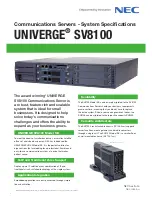
17
Proprietary Information: Not for use or disclosure except by written agreement with Calix.
Proper Grounding Techniques
WARNING!
Extreme care must be taken when attaching the ground
connectors to the utility (earth) ground rod. If the ground is interrupted or
disturbed in any way, an unsafe condition will exist.
The National Electrical Code (NEC), the Rural Electric Association (REA) and state/local
codes require that the ONT be properly grounded. A proper ground is one that bonds the
ONT to the buildings primary earth electrode. It is at this point that the power utility is also
bonded. The bonding conductor used must be a #6 AWG copper or equivalent. The NEC
grounding requirement stipulates that earth electrodes must conduct to earth with no more
then 25 ohms of resistance. If 25 ohms can not be achieved with a single electrode a
secondary electrode must be used and bonded together using a #6 AWG copper conductor
or equivalent. The secondary ground electrode must be spaced at least 8 feet away from the
primary electrode. The primary and secondary electrodes, once bonded together, become the
buildings primary ground point. The above named agencies do not require any additional
electrodes to be installed unless the ONT is located more then 20 feet away from the
buildings earth electrode.
If the ONT can not be installed within 20 feet of the building's primary earth electrode, an
additional ground electrode must be provided and bonded to the primary ground point of
the building. A #6 AWG copper conductor or equivalent bonding jumper must be used
between the earth electrodes and the ONT.
A suitable earth electrode can be a copper clad steel rod that is driven into the earth at least 8
feet deep or a metallic cold water pipe that is under ground for a distance of at least 10 feet.
If a water pipe is used as an earth electrode it must be no more then 5 feet from the outer
wall that the ONT is installed on.
All ground conductors are required to provide a low impedance path to the earth electrode.
The conductor must take the shortest and most direct path to the earth electrode and be free
of any sharp bends. If ground conductors are to be placed inside metallic conduit they must
be bonded to the conduit at both ends using a UL listed bonding type connector.
© 2001-2007 Calix. All Rights Reserved.















































